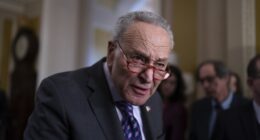Chancellor Rishi Sunak has spent the week listening to recommendation from Conservative MPs on how you can steer a course round what Labour has referred to as the cost-of-living “iceberg” looming over British politics.
Whether or not it’s chopping taxes, rising welfare advantages or suspending “inexperienced levies” on vitality payments, all the potential mitigations are costly and there aren’t any straightforward fixes.
Sunak has acknowledged one thing must be carried out as economists warn of the worst squeeze on living standards because the monetary disaster. “With Covid, he was not afraid to do the unconventional factor and to go large,” stated one ally of the chancellor.
However having simply spent £400bn on propping up the economic system in the course of the coronavirus pandemic, his room for manoeuvre in coping with the cost-of-living crunch is closely constrained.
With inflation above 5 per cent and rising — and with rates of interest heading up — the chancellor has instructed colleagues he won’t borrow his means out of the issues, thereby including to debt servicing prices.
“Nigel Lawson wouldn’t have carried out that,” Sunak instructed the cupboard this week, referring to Margaret Thatcher’s chancellor in the course of the Nineteen Eighties. Tax cuts funded by new public spending reductions are in the meantime deemed politically unpalatable.
The associated fee-of-living disaster is about to peak in April, when big energy price rises coincide with tax will increase that can collectively price a typical family greater than £1,000 a yr.
Tory MPs are urgent the chancellor to behave forward of native elections in Could, and there are at the least 4 potential choices:
Scrapping VAT on vitality payments
The liberty to chop worth added tax on home vitality from 5 per cent to zero was as soon as touted by Boris Johnson as a “Brexit dividend”, however the prime minister stated this week it will be a “blunt instrument”.
The coverage would price £2bn, in keeping with the Decision Basis, a think-tank, and thereby reduce vitality payments by about £100 per family. However, as Johnson identified, the reduce would profit everybody, not simply the poor.
In April the vitality worth cap masking thousands and thousands of households might rise by as much as £700, to nearly £2,000 per family, in response to surging wholesale fuel and energy costs. So a VAT reduce alone — backed by some Tory MPs and Labour — would solely dent the issue.
Ditching deliberate tax rises for April
Jacob Rees-Mogg, chief of the Home of Commons, this week referred to as for April’s planned £12bn rise in national insurance contributions to be dropped. When challenged by cupboard colleagues, he couldn’t say precisely the place he would discover the financial savings to fund the reduce.
Sunak can also be freezing earnings tax thresholds in April, sucking extra folks into larger tax bands. The Daily Telegraph, Johnson’s former employer, requested this week: “Is that actually why folks vote Tory?”
Sunak can not afford to reverse the 2 tax strikes, which on a mixed foundation will price a typical family £600 a yr from April. Downing Road has indicated they may go forward as deliberate.
Eradicating inexperienced levies from electrical energy payments
Some 20 Tory MPs and friends this month referred to as for the suspension of inexperienced levies on electrical energy payments that pay for renewable vitality schemes.
However ministers level out the levies are supposed to fund Britain’s transition away from fuel. Awkwardly, Britain has simply chaired the UN COP26 local weather change summit.
Torsten Bell, chief govt of the Decision Basis, stated that shifting £160 of inexperienced and social levies from electrical energy payments on to normal taxation would add £4.5bn to the general tax invoice, which isn’t a lovely proposition for Sunak.
Rising assist for the susceptible
Focused assistance on vitality payments is already obtainable via the warm homes discount, which supplies a worth rebate of £140 for two.7m poorer households. Sunak is contemplating increasing it.
However that scheme is financed via a levy on the vitality payments of better-off households. If the scheme have been expanded to eight.5m households, with the taxpayer funding a £300 fee, Bell stated that will price as much as £2.5bn.
Paul Johnson, director of the Institute for Fiscal Research, stated Sunak might ease the cost-of-living crunch for the poorest households by rising welfare advantages sharply in April and recouping the price by freezing them for the next two years — hopefully when inflation has retreated.
However he identified the large political problem for Johnson and Sunak are the issues dealing with thousands and thousands of individuals — probably Tory voters — on low and center incomes. “Should you give 10m folks £500, that’s £5bn proper there,” stated Paul Johnson.
Source: DUK Information








